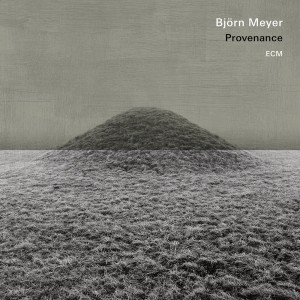 The energetically strummed funk of a tune called “Squizzle” is more or less what I expected when I approached an album of solo bass guitar music. It’s a quick in-and-out of a tune, just the electric bass and some subtle ambient droning. That track and the one simply named “Dance,” which perfectly evokes African rhythms; in fact, Björn Meyer’s bass actually sounds like the African lute called a kora, with its hypnotic octave plucking style. But then, Meyer’s new Provenance is really about subverting expectations for “solo bass” music, and “Dance” starts adding new layers of drones, around which that plucking is looped. In the end, this piece makes a long fade-out that wouldn’t be out of place on a Nic Bartsch project.
The energetically strummed funk of a tune called “Squizzle” is more or less what I expected when I approached an album of solo bass guitar music. It’s a quick in-and-out of a tune, just the electric bass and some subtle ambient droning. That track and the one simply named “Dance,” which perfectly evokes African rhythms; in fact, Björn Meyer’s bass actually sounds like the African lute called a kora, with its hypnotic octave plucking style. But then, Meyer’s new Provenance is really about subverting expectations for “solo bass” music, and “Dance” starts adding new layers of drones, around which that plucking is looped. In the end, this piece makes a long fade-out that wouldn’t be out of place on a Nic Bartsch project.
Which is no coincidence, because Meyer was a member of Bartsch’s Ronin for more than 10 years. The Swedish-born, Swiss-based bassist has created a distinctive voice for this instrument that is more usually a part of the rhythm section of a jazz or rock band, through his ongoing work with the likes of Persian harpist and singer Asita Hamidi, Swedish nyckelharpa player Johan Hedin and Tunisian oud master Anouar Brahem.
In the album’s liner notes, Meyer explains the ritual that he uses starting 27 days before a concert date, which includes recording everything he does: improvisations, experiments, practicing, actual compositions, or various combinations thereof. “At some point during each day, I would cut out exactly 60 seconds of music and release it on the internet as a kind of countdown or diary of ideas,” he writes. “When I started preparing for this album, there were already more than 150 such fragments … I made it a mission to revisit most of the fragments and see what kind of program they would evoke.”
It’s not the more rhythmic and upbeat mood of “Dance” and “Squizzle” that apparently was most comon in those fragments, because the album’s dominant mood is pensive and languid, some of which may be due to the recording space, an amazingly open and resonant radio studio in Lugano, Switzerland. Whatever the case, I find this music perfect for the present moment. From the sci-fi soundscape of the opener “Adebaran” to the mysterious ambience of the closer “Merry-Go-Round,” this is music to focus and calm.
Meyer gets an incredible range of sounds out of his instruments, which are a six-string electric bass guitar and an acoustic bass guitar. The latter shows up most prominently on the title track with its hushed but very guitar-like Andalusian-style finger picking on the instrument’s upper register. There’s a bit of instrumental folk-rock on “Three Thirteen,” quiet jazzy fretboard exploration on “Traces Of A Song” and an echo chamber-like sound, single pulsing notes and gentle thumping on the bass guitar’s strings or body on the ambient tune-scape of “Pulse.” Occasional stabs of dissonance emphasize the watchful mood of Hamidi’s “Garden Of Silence,” and “Banyan Waltz,” though mid-tempo, is a sunny, pastoral tune.
The timing of this release is no doubt entirely coincidental. But as I write this, the U.S. has just gone through an intense series of hurricanes and tropical storms and more incidents of horrific violence and a political scene that seems to get more chaotic by the day. Meyer’s Provenance is not escapist, exactly, but as I said, calming and focusing; the deep drones and repetitive rhythmic patterns help you remember to breathe deeply and be aware of the inner and outer beauty that’s still available. That’s what all good art does.
(ECM, 2017)
